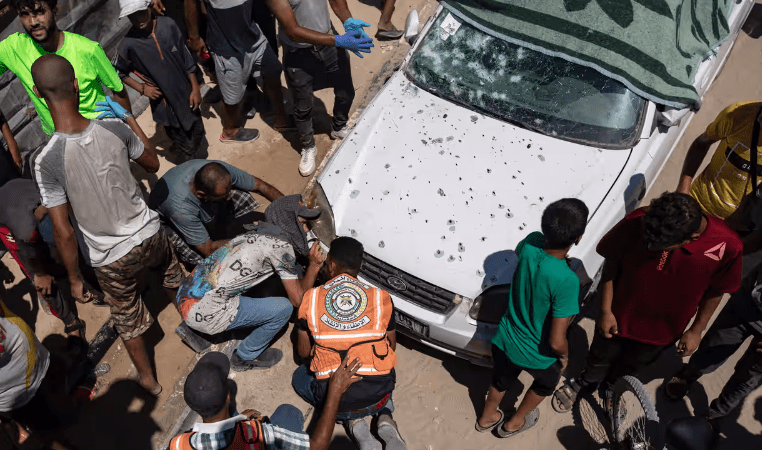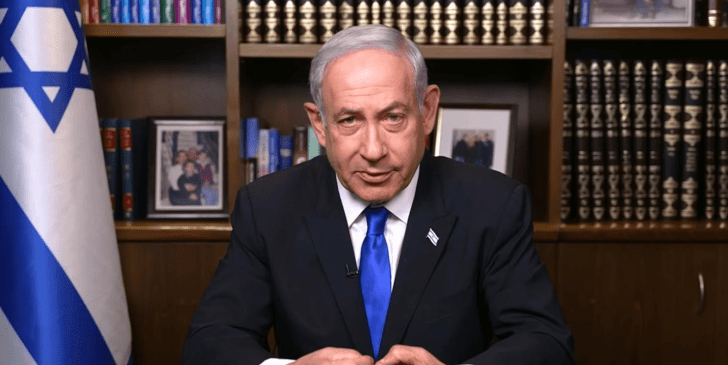At least 60 people have been killed in a series of Israeli airstrikes across the Gaza Strip, health officials reported, as stalled ceasefire talks leave the nearly 10-month-old conflict at a deadly impasse.
Among the targets were a school sheltering displaced individuals and an Israeli-designated “humanitarian zone,” escalating an already dire humanitarian crisis.
On Tuesday, the Red Crescent confirmed 17 fatalities in a bombing near a petrol station in Mawasi, an area on the Mediterranean shoreline densely populated with displaced people that Israel had previously declared an evacuation zone. An additional 16 people were killed in a strike on the UN-run al-Awda school in central Gaza’s Nuseirat refugee camp, according to medics at a nearby hospital.

The Israel Defense Forces (IDF) stated that Hamas militants were present at the school. There was no immediate comment on the strike in Mawasi, but the IDF noted that the air force had struck about 40 targets in Gaza on Tuesday, including sniping and observation posts, military structures, and buildings rigged with explosives.
Hamas and Palestinian Islamic Jihad, a Hamas ally, reported their fighters had attacked Israeli forces with anti-tank rockets and mortar bombs in several locations. Islamic Jihad’s armed wing claimed to have fired missiles at Sderot in southern Israel, although no damage or casualties were reported.
Israel has intensified its bombardment of Gaza in recent weeks, culminating in the deadliest strike on Saturday in Mawasi, which targeted Mohammed Deif, Hamas’s military commander, and killed over 90 people. It remains uncertain whether Deif, who has been wanted by Israel for decades, was among the dead.
The IDF announced on Tuesday it had “eliminated” approximately half of the Hamas leadership in Gaza and 14,000 soldiers since the war began following a deadly attack by the Palestinian militant group on Israel on 7 October, which resulted in 1,200 deaths and 250 people taken hostage. According to the health ministry in the Hamas-administered territory, more than 38,400 Palestinians have been killed in Israel’s retaliatory operations, leaving the population of 2.3 million in dire need of food, water, medicine, and shelter.

Hamas has not yet commented on Israel’s claims. The elimination of Deif would be a significant morale boost for Israel, which has struggled to neutralise any of the top three Hamas leaders in Gaza after nearly 10 months of conflict.
The targeting of Deif and subsequent deadly attacks on Gaza have seemingly contributed to a deadlock in ceasefire and hostage-prisoner swap negotiations being held in Qatar and Egypt. Egyptian mediators reported that talks stalled on Saturday.
Hamas has sent mixed messages regarding its future participation in the talks, which were the most promising in a series of failed negotiations since an initial ceasefire and hostage release deal brokered in November. That truce collapsed after a week, following what the US claimed was Hamas’s inability or unwillingness to release more Israeli captives.
On Sunday, Hamas’s Qatar-based political leader, Ismail Haniyeh, stated that the group was withdrawing from the indirect talks in protest of recent Israeli “massacres,” but expressed readiness to return to negotiations if Israel “demonstrates seriousness in reaching a ceasefire agreement and a prisoner exchange deal.”
A Palestinian official close to the negotiations told Reuters that Hamas did not want to appear as if it were halting negotiations despite the intensified Israeli attacks. “Hamas wants the war to end, not at any price. It says it has shown the flexibility needed and is pushing the mediators to get Israel to reciprocate,” the official said.
The group has accused Israeli Prime Minister Benjamin Netanyahu of seeking to derail a deal and prolong the war for political gain. Nevertheless, Israel’s Defence Minister, Yoav Gallant, expressed optimism on Tuesday, telling the families of five female soldiers kidnapped during Hamas’s 7 October attack that “this is the closest we have ever been to a deal,” according to Israel’s Channel 12.
Truce talks have repeatedly faltered over disagreements about the identities and numbers of Israeli hostages and Palestinians held in Israeli jails. The situation has been further complicated by Israel’s seizure of the Rafah border crossing into Egypt in May, which Hamas and international delegations insist must be returned to Palestinian control.
US State Department spokesperson Matthew Miller reported that two senior advisers to Netanyahu stated Israel remains committed to reaching a ceasefire. Miller also criticised the “unacceptably high” civilian casualties of recent days.
Washington, Israel’s most important ally, has provided significant military and diplomatic support for Israel’s war in Gaza, despite domestic backlash.
On Monday, the EU joined a wave of international measures against extremist Israelis, announcing new sanctions on three prominent Israeli settler leaders in the occupied West Bank and a pro-settlement group, Regavim, which was founded by Israel’s current Finance Minister, the far-right Bezalel Smotrich.

